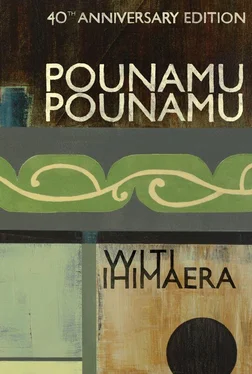I was only a young boy when the makutu was put on Mrs Jones. She was a widow, and she had the contract to do the rural delivery in Waituhi. Her husband had been the rural delivery man before he died, and she took over afterwards. Every Monday, Wednesday and Friday, Mrs Jones would get into her van and go to the Gisborne post office to collect the mail for all the farms and houses in the village and surrounding district. She’d also stop off at the bakery, the grocery and the bookshop to pick up the stores and newspapers ordered by the people on her run. Then she’d start out, stopping at one farm after another, making her deliveries. It was a long job and sometimes it was a heavy one: she often had to take bags of flour or sugar, or heavy farm machinery, to deliver to a person on her round.
But Mrs Jones was a strong woman, and she used to say it was the Irish in her that made her so strong. She was tall too, and quite able to look after herself. She’d still been in her thirties when her husband had died, and the men hadn’t even let him be dead a respectable time before they’d started making a play for her. But she wouldn’t have any of them on and, if they got too close, they’d find a fist in their way. She didn’t mind a mild flirt, but anything more really got her blood up. The trouble was that she was such a damned handsome woman and had so much spirit, that men found her irresistible. Maybe it was the combination of reckless green eyes and a throaty chuckle which did it. Especially around Pakowhai pa, she was very popular. But she’d just laugh the men off.
‘Go back to your wife, Hepa!’
‘If you weren’t boozed, I might believe you and take you on, Frank Whatu!’
‘I’d eat you for breakfast, lunch and tea, boy!’
Because of her attitude, the women weren’t at all jealous of her. They knew she wouldn’t tolerate any funny business, and saw behind her bluff and cheekiness to the lonely woman inside. Then too, they knew that her fist would always save her.
But even her fist, with all its power, couldn’t save her against Mr Hohepa.
Mr Hohepa was one of the men on her round. He was an old man, and was a tohunga in our district. When I was a child, and I’d done something wrong, I wouldn’t be threatened with some grotesque bogeyman but with Mr Hohepa.
‘Pae kare! I’ll put Mr Hohepa on you!’ Mum would say if I’d been naughty.
My sisters and I were very scared of him. He was the three in one: Dracula, Frankenstein and the Werewolf. On dark nights, we would swap stories about him: how he’d put a spell on Kararaina Baker and she’d had a baby, or how evil things happened at his house. As the night grew longer, the stories would grow wilder until one of us would begin to cry. Once one of us started, then the rest would, and Mum would come in and say:
‘Hey! What’s wrong with you kids! If you don’t go to sleep, I’ll send you to Mr Hohepa’s place!’
That always made matters worse, and we really wouldn’t be able to go to sleep then. We’d clutch each other tightly in the dark and in the end, we’d sneak into bed with Mum and Dad. Only with them, would we be safe from Mr Hohepa.
We used to avoid him. All the kids around the pa avoided him. If we saw him coming down the road, we’d back away. Anything not to see those fierce black eyes. He’d only have to look at us and we’d think: makutu … makutu … If he hadn’t been so fearsome looking, I suppose we’d have laughed off the threats of our parents. They didn’t seem to be scared of him and they even called him by his first name. We used to think they were very brave. But we’d tremble too, wondering whether Mr Hohepa would strike them down with lightning, or worse still, whether he’d change them into a kina which he would eat later.
I suppose he must have always looked old, even when he was young. Even today, he doesn’t seem to have changed in appearance. He was a tall man with an enormous nose which hung over his mouth. His lips were dark purple and were always quivering. We children used to think he was muttering spells — his lips had to be quivering for some reason! His face was very flabby and his eyes were wide and black, with the whites so white that you could tell a mile off when he was coming. One of his ears had a chewed-up look, as if he’d been in a fight during a time when he was a werewolf. From the other ear, hung a long greenstone pendant.
Although he was tall, Mr Hohepa appeared short as he had a stoop because of his bad leg. He had a carved tokotoko stick to help him walk. As children, we were always scared of that tokotoko because it was inlaid with paua which looked like the eyes of people he had possessed. And every now and then, he would mutter to the stick and bang it on the ground as if he were angry with it. Or else he would wave it round his head while he was talking to somebody flat out in Maori. We’d listen, tremble and think:
‘Here it comes. The makutu.’
Wherever he went, he always wore a feather cloak. And because he was a tohunga, he was often asked to represent our village at Pakeha functions, like when the library was opened in the nearby city. Pakehas were scared of Mr Hohepa too. The Mayor didn’t even say a word when Mr Hohepa got up at a public function and started waving his tokotoko at him because he’d put Mr Hohepa in the second row.
He wasn’t married, Mr Hohepa, and we children weren’t at all surprised. He was nearing fifty when he put the makutu on Mrs Jones.
That was about twelve years ago. I’m a grown man now, and I realise my view of Mr Hohepa was childish. At the time all I saw of him was his scary qualities. I hadn’t understood that the way he dressed, intimidated people and wielded his walking stick were also signs not of makutu but of leadership. Not only was he a tohunga, he was also a very powerful tribal leader. He was like Miro Mananui, who was a tribal leader also and, like her, he was battling to get the Government to give us back our land.
But in those days I was a know-nothing eleven-year-old. I wasn’t a very strong kid and had lost more fights than any other boy at school. I remember it was coming on to Christmas at the time, and I needed some money to buy presents for the family and a water pistol for myself. That’s why I went into Mr Anderson’s shop when I saw the notice outside:
WANTED
Strong boy to help deliveries
When I saw some of my other friends waiting in the shop, I didn’t think I’d have much chance for the job. But I sat down on the stool with them. I’d nothing better to do, and if I went home, Mum would only make me work round the house.
‘What’s the job?’ I asked Winti Edwards.
He shrugged his shoulders.
‘Search me,’ he said. ‘But the notice says they want a strong fella.’
‘I’m not here for the job,’ I told him hastily, making a quick decision. I’d already had one hiding from Winti that week and didn’t want another.
‘What you here for then?’ the others asked.
‘Nothing,’ I answered. ‘I’m allowed to sit here if I want to. You fellas don’t own this seat.’
The boys eyed me ominously. Then Winti said:
‘Well, you might as well clear off, and you other fellas too, because I’m the only strong one here.’
And to prove it, he crooked his arm, making his muscles swell like growing peaches.
‘See?’ he growled at me, thrusting the peaches under my nose. ‘Have a feel of them!’
I touched them gingerly, afraid that they might hit me in the eye. But before they could do that, Mr Anderson came out of the back room of his store.
‘What’s the job, boss?’ Winti asked, in what he assumed was a manly voice.
‘Ask the lady,’ he snapped. He pointed to Mrs Jones, who’d been eyeing us all from the counter. Her eyes were twinkling and she was grinning broadly.
Читать дальше












